|
|
|
Sort Order |
|
|
|
Items / Page
|
|
|
|
|
|
|
| Srl | Item |
| 1 |
ID:
084474
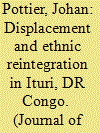

|
|
|
|
|
| Publication |
2008.
|
| Summary/Abstract |
This article examines the ethnic character of Ituri's complex emergency. It considers the local context in which the IDP predicament has unfolded, asking questions about the prospect of, and responsibilities for, post-conflict reintegration. As militia disarmament and peace are linked but not coterminous, it is argued that militant ethnic agendas at the core of the conflict must be scrutinised for their ongoing significance. Revealing the past to be a contested terrain, these agendas call for an apartheid-style solution along lines of segregation first envisaged by Belgian colonialists. To move towards ethnic reintegration, Iturians face the challenge that they must create a common history freed from the stranglehold of extremist interpretations.
|
|
|
|
|
|
|
|
|
|
|
|
|
|
|
|
| 2 |
ID:
084473
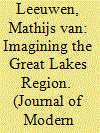

|
|
|
|
|
| Publication |
2008.
|
| Summary/Abstract |
The idea has gained ground in recent years that, as conflicts in the countries of the Great Lakes Region are strongly interlinked, regional approaches are necessary to resolve them. This interest in regional dimensions of conflict and peacebuilding also gains currency in other parts of the world. Attention to regional approaches is reflected in the efforts of international organisations and donors to promote civil society peacebuilding. They assume that regional cooperation and exchange between civil society organisations contribute to peace, and provide an alternative to single-country interventions or regional diplomatic initiatives. This paper explores how such assumptions work out in practice. Experiences in the Great Lakes Region show that local and international organisations have difficulty in analysing the regional character of conflict and arriving at collaborative regional strategies. Moreover, local civil society organisations are deeply embedded in the politics of regional conflict. Consequently, the shift to regional peacebuilding approaches remains more theoretical than practical. This paper suggests that international supporting organisations need to adjust their ambitions in regional peacebuilding, but nonetheless have roles in fostering regional identification among civil society organisations.
|
|
|
|
|
|
|
|
|
|
|
|
|
|
|
|
| 3 |
ID:
084471
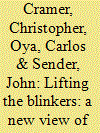

|
|
|
|
|
| Publication |
2008.
|
| Summary/Abstract |
This paper presents some results from the largest rural labour market survey yet conducted in Mozambique. Evidence from three provinces shows that labour markets have a significant impact on the lives of a large number of poor people, and that employers exercise considerable discretion in setting wages and conditions of casual, seasonal and permanent wage employment. The evidence presented comes from a combination of a quantitative survey based on purposive sampling with other techniques, including interviews with large farmers. The findings contrast with ideas that rural labour markets are of limited relevance to poverty reduction policy formulation in Africa, and the paper concludes with methodological, analytical and policy recommendations.
|
|
|
|
|
|
|
|
|
|
|
|
|
|
|
|
| 4 |
ID:
084470
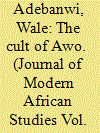

|
|
|
|
|
| Publication |
2008.
|
| Summary/Abstract |
This essay examines the 'posthumous career' of Chief Obafemi Awolowo, the late leader of the Yoruba of Nigeria. It focuses on why he has been unusually effective as a symbol in the politics of Yorubaland and Nigeria. Regarding Awolowo as a recent ancestor, the essay elaborates why death, burial and statue are useful in the analysis of the social history of, and elite politics in, Africa. The Awolowo case is used to contest secularist and modernist assumptions about 'modernity' and 'rationality' in a contemporary African society.
|
|
|
|
|
|
|
|
|
|
|
|
|
|
|
|
| 5 |
ID:
084475


|
|
|
|
|
| Publication |
2008.
|
| Summary/Abstract |
Since Nigeria's transition from military to civilian rule in 1999, the country's Supreme Court has risen from a position of relative political obscurity and institutional vulnerability into a prominent and independent adjudicator of inter-governmental disputes in this chronically conflicted federation. Examined here is the Court's arbitration, during President Olusegun Obasanjo's two civilian constitutional terms (1999-2007), of fifteen different federal-state litigations over offshore oil resources, revenue allocation, local governance and public order. The Court's federalism decisions were remarkably independent and reasonably balanced, upholding the constitutional supremacy of the Federal Government in several findings, tilting towards the states in some declarations, and simultaneously underwriting federal authority and state autonomy in other rulings. Despite the Court's important and independent role, however, the Nigerian federation was vexed by violent conflicts, underscoring the structural, political and constitutional constraints on judicial federalism in this notoriously complex and divided country.
|
|
|
|
|
|
|
|
|
|
|
|
|
|
|
|
| 6 |
ID:
084476
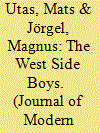

|
|
|
|
|
| Publication |
2008.
|
| Summary/Abstract |
The West Side Boys were one of several military actors in the Sierra Leonean civil war (1991-2002). A splinter group of the army, the WSB emerged as a key player in 1999-2000. In most Western media accounts, the WSB appeared as nothing more than renegade, anarchistic bandits, devoid of any trace of long-term goals. By contrast, this article aims to explain how the WSB used well-devised military techniques in the field; how their history and military training within the Sierra Leone army shaped their notion of themselves and their view of what they were trying to accomplish; and, finally, how military commanders and politicians employed the WSB as a tactical instrument in a larger map of military and political strategies. It is in the politics of a military economy that this article is grounded
|
|
|
|
|
|
|
|
|
|
|
|
|
|
|
|
|
|
|
|
|